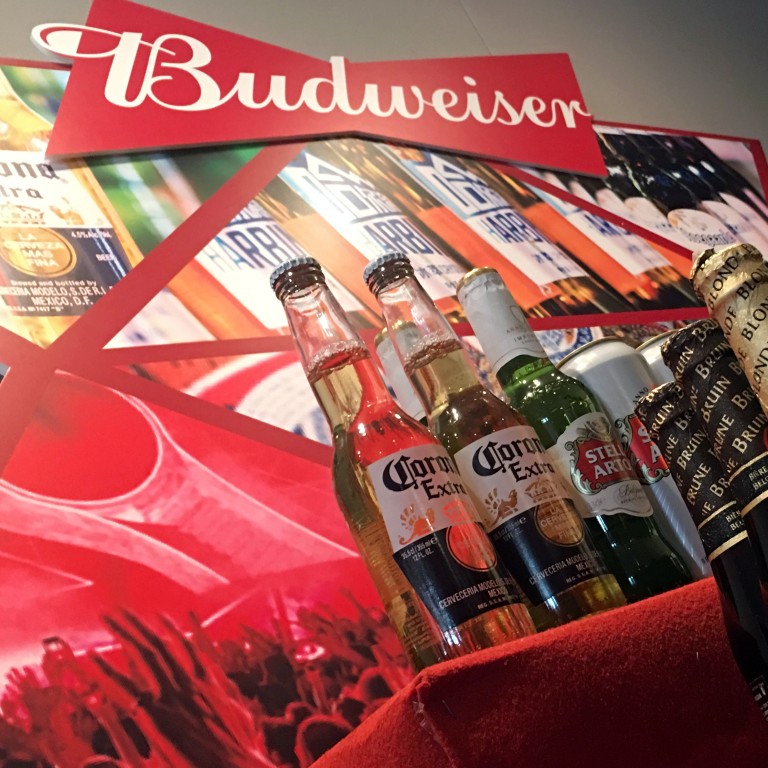
Budweiser shares close 4 per cent higher on trading debut in Hong Kong
- The brewer’s US$5 billion IPO is the second-biggest listing globally this year after Uber Technologies
- Listing is a boost to the Hong Kong stock exchange as it fell behind New York, Nasdaq for global fundraising crown this year
Shares of Budweiser Brewing Company APAC, the regional arm of the world’s largest brewer, jumped more than 4 per cent on Monday as they made their trading debut in Hong Kong.
The company’s initial public offering came at a time when the city is enduring one of its worst political crises.
The revived US$5 billion offering last week was a shot in the arm to the Hong Kong stock exchange following a turbulent summer that saw several companies delay their IPOs as anti-government protests threatened the city’s reputation as an international financial centre.
Budweiser’s is the second biggest listing this year after Uber Technologies’ US$8.1 billion IPO in New York in May.
The Asia-Pacific unit of Anheuser-Busch InBev priced its shares last week at HK$27 each, the bottom of its price range of HK$27 and HK$30. Shares of Budweiser closed 4.4 per cent higher to HK$28.20.
The company, which counts Corona, Goose Island and Stella Artois among its brands, had hoped to raise as much as US$9.8 billion earlier this year, but scrapped its listing in July after it was unable to attract the valuation it desired. The company sold its Australian operations to Japan’s Asahi Group Holdings for A$16 billion (US$11 billion) before proceeding with last week’s slimmed-down offering. The Asahi transaction is expected to close in the first quarter of next year.
“It is a challenging time in Hong Kong, but we are very confident with the strong foundation here,” said Jan Craps, Budweiser Brewing Company APAC’s chief executive, at a ceremony to mark the debut at the Hong Kong stock exchange on Monday. “We are very optimistic with the bright future of Hong Kong as one of the most important financial centres in Asia.”
The listing gave Budweiser an enterprise value of US$45 billion, equating to a price-to-equity ratio of 33 times based on earnings forecasts for next year.
Hong Kong might yet regain crown of top IPO market globally this year
The Budweiser IPO is a needed boost for Hong Kong Exchanges and Clearing, the bourse operator, after the Hong Kong exchange fell behind the New York Stock Exchange and Nasdaq in the first half of this year in the annual race to be the world’s capital for global fundraising.
Investor sentiment has improved somewhat since Hong Kong Chief Executive Carrie Lam Cheng Yuet-ngor formally withdrew the extradition bill that first sparked the demonstrations, earlier this month. But the withdrawal has done little to stem anger on the streets, as violent clashes between police and more radical demonstrators continued for a 17th straight weekend this weekend.
One big test for the market will be whether Chinese e-commerce giant Alibaba Group Holding moves forward with its plan for a US$15 billion secondary listing in Hong Kong after choosing New York for its US$25 billion IPO in 2014. Alibaba is the parent company of the South China Morning Post.
The Budweiser listing also comes as the Trump administration is reportedly considering whether to ban Chinese companies from listing in the US. The Financial Times, citing sources familiar with the discussions, reported on Saturday that the US was exploring stopping Chinese firms from pursuing stock listings on US exchanges and limiting financial investments between the two countries.
Does Trump want to fence off Wall Street from Chinese firms?
Budweiser is betting its listing will entice investors with the growth potential of its remaining Asian operation, which counts its principal markets as China, India, South Korea and Vietnam. The company is the third-largest brewer by volume in China, with a smaller production than China Resources Snow Beer Holdings and Tsingtao Brewery, both of which are listed in Hong Kong.
Shares of China Resources closed 1.1 per cent higher at HK$41.55 in Hong Kong on Monday, while Tsingtao’s shares fell 0.2 per cent to HK$47.30.
Excluding the Australian operations, Budweiser earned US$6.7 billion in revenue, with US$959 million of net profit in 2018. The company employs more than 29,000 people.
Proceeds from the Budweiser offering will be used to pay down debt at its parent, Anheuser-Busch InBev. After acquiring SABMiller three years ago, Anheuser-Busch InBev’s debt grew to more than US$100 billion. If an overallotment of shares is fully exercised, the offering would raise US$5.75 billion.


